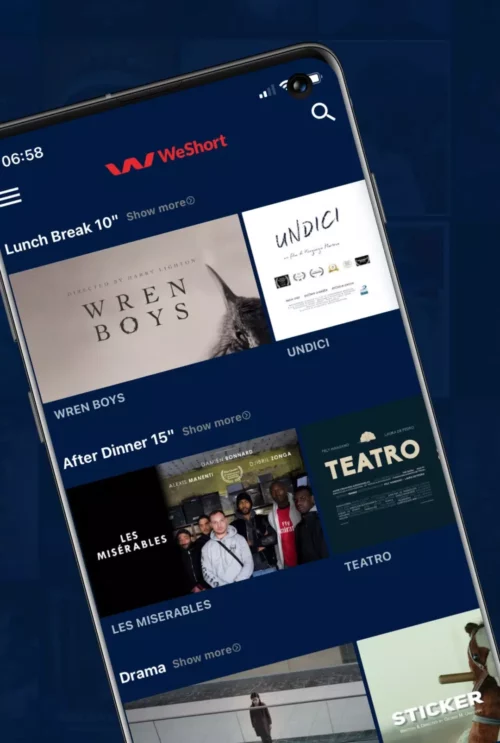I have always thought that to be fully appreciated in your field you must provide value to create value. It seems an obvious statement, and yet most people are used to just asking for something.
– Alex Loprieno, CEO of WeShort

Founded by Alessandro Loprieno in 2020, WeShort is an Italian streaming platform dedicated to international short films. The platform aims to showcase and promote short films from all over the world, giving a third entertainment option to the new audiences in addition to traditional films and television series. An example of these great achievements is the newly acquired An Irish Goodbye, the 2023 Academy Award-winning short film, distributed by WeShort itself in theaters. So, let’s have a talk with Alex, the man behind this fascinating transformation in the film industry.
Alex, could you tell us about your background and what drew you to this project?
Before starting WeShort, I worked 9 years as a flight attendant for Ryanair. I was popular among the passengers for my funny advertisements for the sale of charity scratch cards. I was among the best Ryanair salesmen, and that experience enhanced my public speaking skill. In those years, I also became passioned about finance, marketing and technology. My unconditional love for films had its roots in my childhood already. And so, one day, while I was sitting alone in a multiplex, waiting for my film to begin, I came up with this idea: I began questioning myself on why they didn’t show short films while the screen was still off. Then, I thought, “Why don’t people watch and enjoy short films like they watch series with short episodes, or even Instagram stories?”
Truer words were never spoken. Today, we’re used to watching Instagram stories that take just a few seconds, and web series lasting a few minutes: these habits are already ingrained in us. Anyways, it is always interesting to know the story of someone who suddenly has an intuition, decides to reinvent himself and makes it happen. What were your first thoughts regarding a career change and when did you realize it was time to enter the international film industry with this innovative approach?
As I said, during my 9-year experience at Ryanair, I became passionate about marketing, finance and technology. Towards the end of this journey, I only had 5,000 euros in my savings, and my idea was to invest it in something that was related to my passion for films. I strongly believed in the decentralization and democratization of investments in the film industry. That’s when my idea for WeShort began to take shape in my head: I wanted to create a platform that offered a brand-new, streaming-based distribution to new filmmakers. In addition, WeShort’s business model aimed to intermediate in the acquisition of the intellectual properties showcased on our platform, and this could have been our opportunity to sit down with big-time production companies as well.
Well, I would say that this is good material for a biopic already, but let’s move on. Just a small curiosity: where does your love for films and short-form content come from? You seem profoundly passionate about this niche.
It was 1995 when my uncle took me to the theatre for the first time, the film was Dragonheart, I was five years old. That day, I discovered the incredible power of Cinema: it immediately became a passion, and I read so many film magazines and watched so many films that my friends started calling me to ask for advice on what to watch. As a teenager, I soon realized that it was the only thing that really fascinated me at a deep level. Then, another realization: Cinema was originally born short, in a form that today we would call a short film. However, in the early 20th century, it was known simply as a “film,” because that was the standard length of any film production. Today, I believe we’re ready to rediscover that storytelling form, with films that are shorter, easily accessible, and within everyone’s reach.
WeShort is now a fast-growing reality. What do you think are the main ingredients of your success?
Truth be told, I think I had a pretty simple idea or, at least, nothing groundbreaking in the current audiovisual landscape. Nonetheless, we can look at WeShort as an innovation of process, strategy, community, and technological advancement. My team and our community are a single entity: every day I have a coffee with directors and producers to strengthen this bond of trust, respect and collective growth. In fact, I believe that PR is still my most important skill and an essential ingredient of our success, as our constant perseverance in the search for new partners and talents allowed us to reach people and organizations that I could only dream about.
Organizations! That’s exactly what my next question is about. Your company is establishing important partnerships with many international players. How do these partnerships work?
In the last year, we have launched the partnership with MYmovies, where we now have our own window. Two other prestigious international partnerships are the one with Guinness World Records and the Sundance Institute. We have officially brought WeShort to movie theaters with the distribution of An Irish Goodbye, the 2023 Oscar-winning short film. The most recent one is our partnership with Trenitalia, which allowed us to make WeShort available on all the Italian and international high-speed trains. Thanks to the external market demand we have turned into a B2B2C model (Business-to-Business-to-Consumer). This is certainly another innovation of process that we are proud of.
What was the immediate response from the public and the filmmakers as the website landed on the immense world of the internet? Did the international film festivals function as a sound box for your project?
Obviously, there wasn’t an immediate boom in subscriptions, but marketing and brand awareness have certainly been the driving force that we needed to attract many early adopters interested in our idea and our technology. In this regard, our growth has been gradual and proportionate to the investments we made. As for the filmmakers, there has been a lot of interest since the beginning from all over the world, with proposals to sell packages, or single short films from the United States, Canada, South America, Africa and Europe. So, we can all agree that WeShort has been an excellent solution for those who made short films and wanted to showcase them on an international platform.
Let’s talk about numbers. Can you walk us through the process of raising funds, building this streaming platform dedicated to short-form content, and launching it on the market?
Sure. In March 2019, I came up with the idea for a short-film platform while I was at the movies, and that afternoon I simply asked myself why people didn’t watch short films before the feature began. In a year, I was able to shape my idea for WeShort, and involve my father and my uncle in the project with a 50k investment aimed to develop the platform. As soon as we went on the market, we raised other 57k coming from the first angel investors. From September 2020 to September 2021, WeShort had benefited from other 228k, half of which came between September and October 2021 – that’s one month only!
This is what start-uppers call a pre-seed stage. Then, a year later, when were about to run out of funds, Minerva Pictures, a notorious Italian production and distribution company invested on us, closing an important round that, added to the previous investments and the victory of a public cash prize, saw the total investment reach a million in two years. Technological infrastructure, marketing, platform, content management, travels, and networking were the major costs in this first business endeavor. Now we expect another round of medium-size investments, and finally an high-rolling one.
Were there circumstances in which you had to make difficult entrepreneurial choices? If so, how did you compromise and make it work?
In October 2022, the company was short of financial resources. The only thing to do was to take action. So, I put on my backpack and went to Venice to meet potential partners. Those last months were probably the toughest phase of my journey – the so-called Valley of Death for start-uppers. However, the strength of our idea and the desire to continue to grow our community allowed us to find a great partner in Minerva Pictures, an independent production and distribution company that believed in our brand and the technological transformation we represented in the film industry.
What’s your angle on how short-form content changed through the years? Do you think that we are at a new frontier of entertainment?
I believe that filmmakers shouldn’t be committed to this storytelling form just for the sake of arousing the interest of big-time producers – this would be reductive. We need short stories that are suitable for this storytelling form and are able to make it stand alone as a proper niche. Furthermore, if you are a director who wants to make his directorial debut with a feature film, and you’ve already won awards with your short, this means that you already have your own audience, which is something that shouldn’t be underestimated. And those who know a director from his short film are the fanatics, the cinephiles, the most loyal audience, the hard core of the fan base. Let’s take, for instance, those European soccer teams that made the main league. Year after year, they moved from D to A league, right? Now, can you explain to me why only 500 people supported them in the D league while now that they are in the A league there are 50,000 people that go to the stadium? The answer is very simple: some things are done out of passion, others out of fashion. The world of short films is where everything is born, where those who feel the need to tell a story put their hands in their pockets, and build the strongest relationship with those 500 people that were there from day one.
In this regard, can you tell us what are the key factors that, in your opinion, concur to make a good short film?
A story worth telling must be the basis of every project. The way this story is told through images is a very important aspect as it is useful to define the voice of the director who is telling the story. In this context, we can also notice the style, tone of voice, attitude towards a specific genre. Subtext is also an important element in a short film, as we can say a lot of things through meticulously placed details in the narrative. Also, unknown yet promising actors are a rarity, but they exist, and sometimes they can be found in the most unexpected places. These performers represent a great factor of success, and it is up to a good director to bring out the best in them.
What do you think the future of the film industry will look like? What kind of trends and habits do you think will emerge and transform the audience’s experience?
We are living in the era of overflowing content, where content is there but the audience’s attention is almost gone. The audience no longer has the reference points they once had. Companies such as Netflix, Amazon Prime, and Disney are blurring their lines in terms of identity, whereas people want something more recognizable; people want to go back to having their own little comfort zone.
So, I think that players with a stronger identity will do a lot, whether it’s about shorts, horror, comedy, etc. Providing more solid reference points is certainly the new frontier. Perhaps, this could be done through a cross-platform, interconnected system, and a strategy that is no longer competitive among platforms, but integrated. They will be distinguished on the basis of their identity, or even their genre. In this regard, a cool company that is certainly giving us great demonstration of a strong identity is A24. The brand paves the way for a more recognizable film or TV show. WeShort aims to pave the way for short films in the international film industry.




